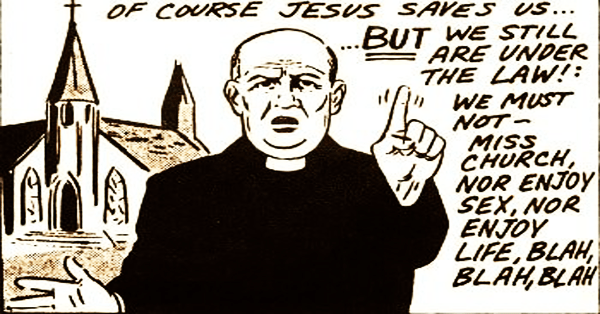
To purchase the entire Summit Lecture Series, Vol. 1 on DVD, go to summit.org
So, in light of all the different competing worldviews out there (Christianity, Islam, Secular Humanism, Marxism, Cosmic Humanism, and Postmodernism), I want to turn our attention to the question: How do we evaluate our own worldview?
How can you understand the worldview and beliefs that you actually live out each day? In other words, how can we connect what we know is true with how we actually live, and how do we know what is true?
Now, in our Christianese language, we often talk about things like having “head knowledge” versus having “heart knowledge”; and I understand what the point of that is. But, Biblically, there is no distinction between knowing something in your mind or your heart. Biblically, if you did not live out something, then you didn’t really know it. The Hebrew word for knowledge is an intimate and embodied one. In fact, if you go to your King James Version of the English Bible, the word used for sex is “know”. That reveals how intimate knowledge is in the Bible.
So, according to the Bible, if you have a worldview, it’s not because you can academically understand it or debate it, but it’s something that you actually live out daily.
One of the classic ideas of this is the word VIRTUE.
Virtue is the idea that we should be people that behave with consistency between what we say, what we know and how we live. But, we’ve lost the language of virtue.

In place of virtue, we have come up with several other strategies of what it means to be a good person.
One example is to have more rules in our lives. If we are bad people and we want to be better people, the solution is to have more rules. Because rules can be like fences in our lives and they will protect us innocent people from those “bad people”. I grew up in a culture like this. We would scour through the Bible looking for as many rules as we could come up with, and then added a couple hundred more just to be safe. The idea was that if we had long skirts and short hair at our Christian school, the girls wouldn’t get pregnant while attending here.
But, guess what… the girls got pregnant. It’s not about the skirts.
Nowadays, our own government is attempting this idea of “more rules”. Since the 2008 financial collapse, Congress has jumped in with more regulations. They feel like they need to produce a solution to prevent another case of predatory lenders going after innocent borrowers and forcing on them loans that they really shouldn’t have.
Now, were there predatory lenders? Absolutely.
Did they put together ridiculous mortgage packages and give them to people who did not deserve loans? Absolutely.
They did this, and then they packaged good loans together with bad ones and shipped them overseas to Germany, knowing that they would never have to collect on them. This was indeed unethical.
However, part of why they were doing this was because Congress kept saying, “Everyone deserves a house!” And the Congressmen who were the loudest were the ones getting the biggest kickbacks from the mortgage companies. This equated to a bribery / pay-to-play, which was indeed unethical.
But, then there was the average American. We went in to get loans – in fact, I went in to get a home loan during this time. I said, “I need to borrow this amount to buy a house.” And they said, “Oh no… you can get three times that much money. And, you don’t have to worry about paying it back because your house will instantly and automatically go up in value, so you can just pay on the interest and then sell it for a whole lot more money… and without actually working, you can have a huge profit!”
And that was indeed unethical.
This showed that a whole lot of people across America signed on the bottom line for a mortgage like this even though they couldn’t pay it back. They didn’t have the ability to delay gratification.
More rules would not necessarily make these types of people better people.
On a similar note, I had the opportunity to do an interview with Jack Abramoff. Jack’s name has become, for many people, synonymous with government corruption, in terms of lobbying. This guy made billions of dollars in corrupt lobbying practices. And, as soon as they put him in jail for what he did, they added a whole slew of new rules. So, I asked Jack, “Do you think that all these additional rules and regulations are going to clean up the industry?”
“Oh no”, he replied, “because all new rules do is make you better at going around the rules.”
In other words, protecting “us” from “them” is noble. But, the same fences that protect us from them do not protect us from ourselves.
Now, of course, we continue to make more new rules because since the 1960’s, we have been getting rid of rules left and right.
This is all in the name of freedom, specifically sexual liberty or sexual freedom. The idea here is that in order to have freedom, we ought to have less rules.
There is a Christian version of this, too. It goes something like: God is a God of grace and He has no expectations of your life. We live in His grace, so just live however you want.
The idea behind these frameworks is: Let’s get rid of all the rules in the name of freedom.
But, as I have said time and again, the battle of ideas is the battle over the definition of words. The word FREEDOM needs to be redefined. Because today, freedom means to be able to do whatever you want, whenever you want, however you want, wherever you want, with whomever you want, as if there are no consequences to your actions.
Think about this: I saw a study recently claiming that Americans are now at an all-time high when it comes to addictions. We are addicted to everything: sex, drugs, each other, chocolate, coffee… (well coffee is okay because that addiction is mine).
Now, someone who is addicted to something is a slave to it. Isn’t it interesting that our definition of freedom has actually made us a slave? This tells us that we have a bad definition for freedom.
This definition of freedom: that we can do whatever you want, whenever you want, however you want, wherever you want, with whomever you want, as if there are no consequences to your action, assumes that there is no design to the world.
Here’s an example of what I mean…
Let’s say that I’m a pilot and I hop down to the airport down in Colorado Springs. I take my seat in the pilot’s chair of a giant 747 and I decide that I’m going to be “free” today and I don’t want to fly my plane, but I want to drive my plane. So, I get to the end of the runway and turn left. I mean, who’s going to stop me? I’m in a 747! So, I’m cruising down the Interstate, waving to other drivers and running over Hummers. It’s a pretty good day, actually. And then I decide that I want to go see Pikes Peak. So, I start pulling my plane down Manitou Avenue and start driving up the mountain road. How is this going to happen in my 747?
It’s not.
My expression of “freedom” is actually going to end up locking me in. If I really want to see Pikes Peak in my 747, I shouldn’t drive it. I should fly it. Because THAT’S what it was designed to do. A plane is most free not when it is driven but when it is flown because that is what it was designed to do.
If you are designed for something, you are most free when you live out that design, not when you live against that design.